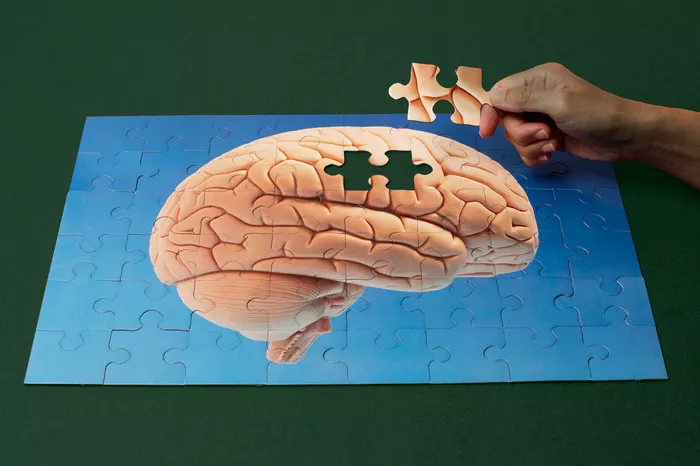A new study from the State University of Campinas (UNICAMP) in São Paulo, Brazil, has revealed that weight training could play a crucial role in protecting the brains of older adults against dementia. Published in the journal GeroScience, the research highlights the cognitive and anatomical benefits of strength training for individuals at risk of dementia, particularly those with mild cognitive impairment (MCI).
Mild cognitive impairment, a condition marked by noticeable cognitive decline greater than expected for age, is often a precursor to Alzheimer’s disease. The study involved 44 participants diagnosed with MCI and tracked their progress over a six-month period. Half of the participants engaged in a weight training program, while the other half served as the control group.
The results showed that those who participated in the strength training regimen not only improved their memory performance but also demonstrated protection against brain atrophy, particularly in the hippocampus and precuneus—regions linked to Alzheimer’s disease. Additionally, there were notable improvements in neuron health, as reflected in the integrity of white matter.
Dr. Isadora Ribeiro, the study’s lead author and a FAPESP doctoral fellow at UNICAMP’s School of Medical Sciences, expressed optimism about the findings. “While we anticipated physical improvements, we were eager to understand how weight training affects the brain in older adults with mild cognitive impairment. The results were promising, showing that weight training is a powerful tool in the fight against dementia, even for those at high risk,” Ribeiro said.
The research was conducted under the Brazilian Institute for Neuroscience and Neurotechnology (BRAINN), a FAPESP Research, Innovation, and Dissemination Center. It is the first study to explore how strength training impacts the integrity of white matter in individuals with MCI.
MRI scans taken before and after the study provided crucial insights into these changes. Dr. Marcio Balthazar, a researcher at BRAINN and supervisor of the study, emphasized the significance of these results, particularly in the context of public health. “This research underscores the importance of incorporating more physical education professionals into the public healthcare system, particularly at the primary care level. Strength training is a cost-effective way to reduce the risk of dementia and protect against cognitive decline,” Balthazar explained.
The cost of anti-amyloid treatments for dementia in the U.S. can reach around $30,000 annually, making non-pharmacological interventions like weight training a valuable alternative. “What we’ve shown is that weight training is not only effective in preventing dementia but also in improving mild cognitive impairment. These findings suggest a potential shift in how we approach dementia prevention,” Balthazar added.
The study participants were split into two groups: one group participated in a resistance exercise program, performing weight training twice a week at moderate to high intensity, with progressively increasing loads. The other group did not engage in exercise during the study period.
At the study’s conclusion, those who completed the weight training regimen showed improved verbal episodic memory and maintained the integrity of brain regions associated with Alzheimer’s disease. In contrast, the control group exhibited a decline in cognitive function and brain health.
Ribeiro pointed out that individuals with MCI often experience volume loss in brain regions linked to Alzheimer’s. However, those in the strength training group exhibited protection against atrophy, particularly in the hippocampus and precuneus, suggesting that regular weight training could have a lasting impact on brain health.
The researchers speculate that a longer duration of strength training could yield even more significant benefits. “All participants in the strength training group showed improvements in memory and brain anatomy,” Ribeiro noted. “Remarkably, five participants no longer had a clinical diagnosis of MCI by the end of the study. This suggests that extended training could not only delay but potentially reverse cognitive decline.”
Weight training’s impact on the brain may be attributed to two primary mechanisms: stimulating the production of neural growth factors, which support neuron survival, and reducing systemic inflammation. “Exercise, including weight training, is known to increase the production of chemicals that promote brain cell growth and reduce inflammation,” explained Dr. Balthazar. “Chronic inflammation is a significant risk factor for dementia, so reducing it is essential in slowing the neurodegenerative process.”
The study also measured biomarkers like irisin and brain-derived neurotrophic factor (BDNF), both of which are associated with neural protection and brain plasticity. The researchers are currently analyzing the relationship between these biomarkers and changes in brain anatomy.
“We plan to continue this research to better understand how these factors contribute to the changes we’ve observed in brain structure,” Ribeiro concluded. “We believe that the combination of anti-inflammatory and neuroprotective factors triggered by weight training leads to these positive outcomes.”
This research offers new hope for preventing dementia through accessible and cost-effective means, with weight training emerging as a promising strategy to enhance brain health in aging populations.
You Might Be Interested In:
-
Study Reveals Link Between Sleep Deficiency and Alzheimer’s Disease Risk
-
Atrial Fibrillation Elevates Early-Onset Dementia Risk in Younger Adults

